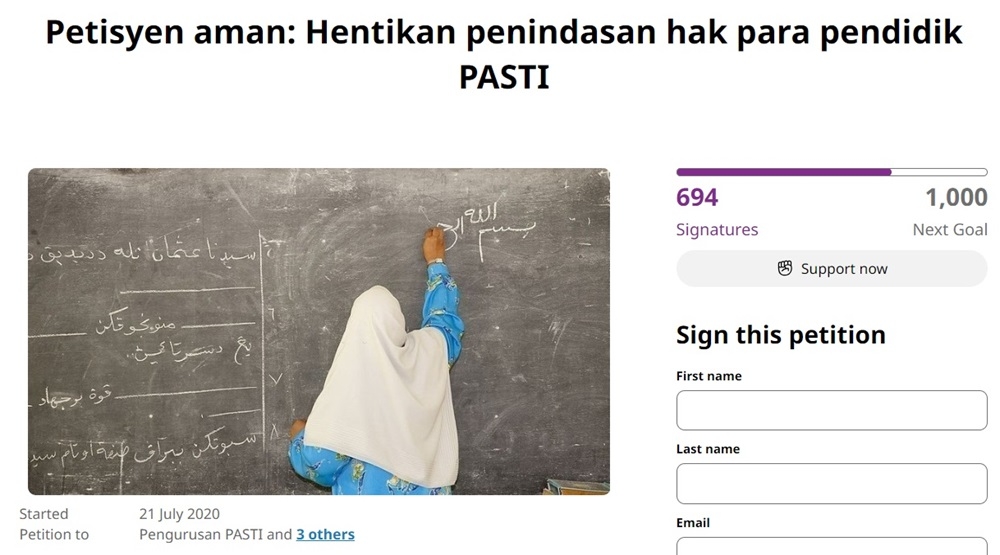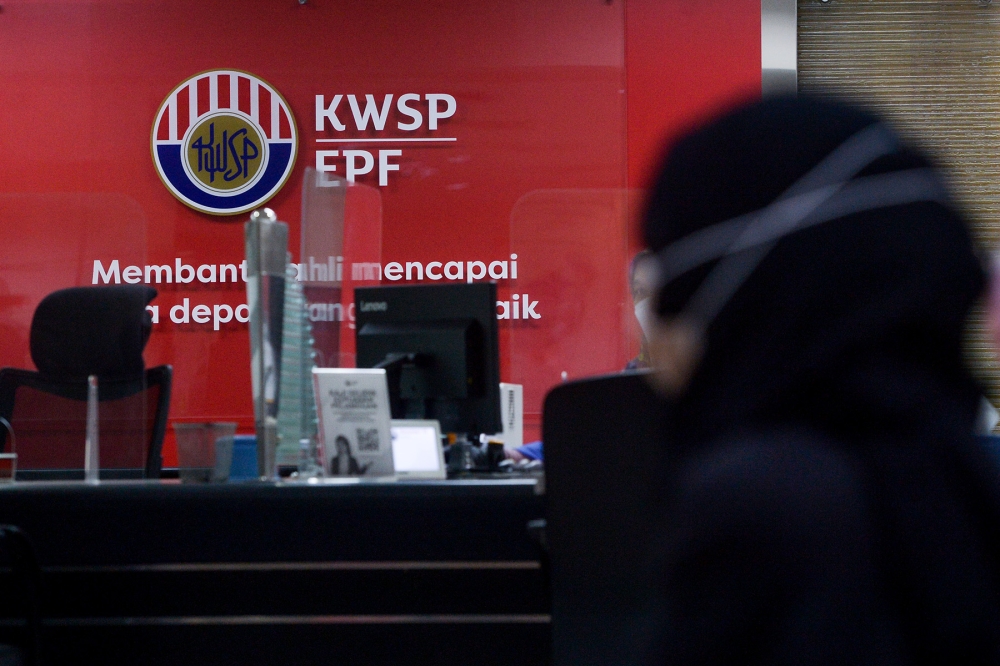RM1,500 pay and no retirement plan: Why teachers in PAS-linked kindergarten Pasti are disgruntled

Last month, the chain of Islamic kindergartens linked toPAS — called Pusat Asuhan Tunas Islam (Pasti) — caught the attention of the Cabinet due to their staff allegedly being paid under the national minimum wage. — Picture by Sayuti Zainudin
Tuesday, 16 Apr 2024 7:00 AM MYT
KUALA LUMPUR, April 16 — Last month, the chain of Islamic kindergartens linked to Islamist party PAS — called Pusat Asuhan Tunas Islam (Pasti) — caught the attention of the Cabinet due to their staff allegedly being paid under the national minimum wage.
It was also reported that the employers did not contribute towards the staff members’ Employees’ Provident Fund (EPF) and Social Security Organisation (Socso) accounts, prompting the Human Resources Department to conduct a thorough inspection of the issue to identify if the teachers were fully employed or under contract.
Moreover, the authorities also checked whether the chain is registered under the Registrar of Societies, Companies Commission of Malaysia or any registered bodies.
What is Pasti?
Started in 1988, Pasti was established by PAS as an alternative education system for the children of its members, but its branches have been accused of being indoctrination centres to recruit potential members from a young age.
Pasti was formed as a response to Taski — Islamic Children Childcare Centre — launched by Islamist group Malaysian Islamic Youth Movement (Abim) in the early 1980s. Taski branches in PAS-dominated states such as Terengganu and Kelantan were handled by their respective Youth wings.
In the PAS Youth’s muktamar or annual congress in 1987, the wing decided that the party should form its own kindergartens, and a division to handle the matter was formed the year after. The following years would see PAS formalising the structure of Pasti nationwide, and in 1999, each PAS branches were directed to build Pasti outlets in their respective areas.
Students from Pasti would usually continue their education by attending PAS-affiliated primary school called Sekolah Rendah Integrasi Teras Islam (Islamic Core Integrated Primary School) and then secondary school SMITI (Islamic Core Integrated Secondary School).

Tuesday, 16 Apr 2024 7:00 AM MYT
KUALA LUMPUR, April 16 — Last month, the chain of Islamic kindergartens linked to Islamist party PAS — called Pusat Asuhan Tunas Islam (Pasti) — caught the attention of the Cabinet due to their staff allegedly being paid under the national minimum wage.
It was also reported that the employers did not contribute towards the staff members’ Employees’ Provident Fund (EPF) and Social Security Organisation (Socso) accounts, prompting the Human Resources Department to conduct a thorough inspection of the issue to identify if the teachers were fully employed or under contract.
Moreover, the authorities also checked whether the chain is registered under the Registrar of Societies, Companies Commission of Malaysia or any registered bodies.
What is Pasti?
Started in 1988, Pasti was established by PAS as an alternative education system for the children of its members, but its branches have been accused of being indoctrination centres to recruit potential members from a young age.
Pasti was formed as a response to Taski — Islamic Children Childcare Centre — launched by Islamist group Malaysian Islamic Youth Movement (Abim) in the early 1980s. Taski branches in PAS-dominated states such as Terengganu and Kelantan were handled by their respective Youth wings.
In the PAS Youth’s muktamar or annual congress in 1987, the wing decided that the party should form its own kindergartens, and a division to handle the matter was formed the year after. The following years would see PAS formalising the structure of Pasti nationwide, and in 1999, each PAS branches were directed to build Pasti outlets in their respective areas.
Students from Pasti would usually continue their education by attending PAS-affiliated primary school called Sekolah Rendah Integrasi Teras Islam (Islamic Core Integrated Primary School) and then secondary school SMITI (Islamic Core Integrated Secondary School).

The recent issue has been highlighted by a group of current and former staff members, Pasti alumni and parents of Pasti students calling itself ‘Hak Guru Pasti’, who said it is fighting for their rights based on the Employment Act 1955 since its establishment in 2020. — Screengrab from Change.org
Who is fighting for the Pasti teachers?
The recent issue has been highlighted by a group of current and former staff members, Pasti alumni and parents of Pasti students calling itself “Hak Guru Pasti” (Malay for “the rights of Pasti teachers”), who said it is fighting for their rights based on the Employment Act 1955 since its establishment in 2020.
According to the movement, there are as many as 10,000 Pasti teachers in Malaysia. On the petition website change.org, it said it is unable to remain silent to see Pasti teachers working hard but without any no retirement plans to guarantee their future.
“We are no longer able to remain silent when we see the teachers as Pasti’s backbones working hard as early as before 7am to as late as 6pm every day. We couldn’t keep our mouths shut when we found out their salary was only around RM400 to RM600 a month. Some even have to do two to three jobs to make ends meet.
“We are unable to look away from seeing teachers and former teachers who have health problems and are struck by misfortune, losing the ability to earn a living for their families,” it said on the petition page.
On its petition page, Hak Guru Pasti listed three of its demands: to ensure all Pasti teachers receive their minimum wage, overtime allowance, and EPF and Socso contributions based on the national law; appropriate compensation to current and former teachers; and guarantee that the future of current and former teachers are defended similar to other workers in the country.
What was PAS’ response to the allegations?
Following the allegations, PAS deputy president Datuk Seri Tuan Ibrahim Tuan Man said the Islamist party was always open to suggestions for improvement.
On March 23, Tuan Ibrahim posted on the social media X, Tuan Ibrahim suggested that the recent accusation against Pasti and other PAS-affiliated education institution was part of a political pressure,
“No matter how strong the pressure and challenges we received, PAS would always grow mature in the nation. PAS always become the reference source for experts.
“The pressure against Pasti, SRITI and SMITI recently reminded PAS and its members of the meaning of ‘sunnatullah’ in a struggle full of ‘mehnah’,” he said, using the Arabic terms that refer to “God’s law” and “challenges”.
Meanwhile, Malaysiakini reported PAS Youth Chief Afnan Hamimi Taib Azamudden questioning the recent attention on Pasti years after its operation.
He claimed that the Islamic kindergarten teachers were volunteers and they were also given allowances for their volunteer work in teaching the children of PAS’ members and supporters.
“The payments that were given were covered by the sections and PAS branches based on their ability. Pasti teachers were also allowed to be absent from their task and PAS’ branches were informed to look for other members who were available to cover the task,” he reportedly asserted.

Who is fighting for the Pasti teachers?
The recent issue has been highlighted by a group of current and former staff members, Pasti alumni and parents of Pasti students calling itself “Hak Guru Pasti” (Malay for “the rights of Pasti teachers”), who said it is fighting for their rights based on the Employment Act 1955 since its establishment in 2020.
According to the movement, there are as many as 10,000 Pasti teachers in Malaysia. On the petition website change.org, it said it is unable to remain silent to see Pasti teachers working hard but without any no retirement plans to guarantee their future.
“We are no longer able to remain silent when we see the teachers as Pasti’s backbones working hard as early as before 7am to as late as 6pm every day. We couldn’t keep our mouths shut when we found out their salary was only around RM400 to RM600 a month. Some even have to do two to three jobs to make ends meet.
“We are unable to look away from seeing teachers and former teachers who have health problems and are struck by misfortune, losing the ability to earn a living for their families,” it said on the petition page.
On its petition page, Hak Guru Pasti listed three of its demands: to ensure all Pasti teachers receive their minimum wage, overtime allowance, and EPF and Socso contributions based on the national law; appropriate compensation to current and former teachers; and guarantee that the future of current and former teachers are defended similar to other workers in the country.
What was PAS’ response to the allegations?
Following the allegations, PAS deputy president Datuk Seri Tuan Ibrahim Tuan Man said the Islamist party was always open to suggestions for improvement.
On March 23, Tuan Ibrahim posted on the social media X, Tuan Ibrahim suggested that the recent accusation against Pasti and other PAS-affiliated education institution was part of a political pressure,
“No matter how strong the pressure and challenges we received, PAS would always grow mature in the nation. PAS always become the reference source for experts.
“The pressure against Pasti, SRITI and SMITI recently reminded PAS and its members of the meaning of ‘sunnatullah’ in a struggle full of ‘mehnah’,” he said, using the Arabic terms that refer to “God’s law” and “challenges”.
Meanwhile, Malaysiakini reported PAS Youth Chief Afnan Hamimi Taib Azamudden questioning the recent attention on Pasti years after its operation.
He claimed that the Islamic kindergarten teachers were volunteers and they were also given allowances for their volunteer work in teaching the children of PAS’ members and supporters.
“The payments that were given were covered by the sections and PAS branches based on their ability. Pasti teachers were also allowed to be absent from their task and PAS’ branches were informed to look for other members who were available to cover the task,” he reportedly asserted.

PKR vice-president Nik Nazmi Nik Ahmad called out PAS President Tan Sri Abdul Hadi Awang who appeared to suggest that EPF savings were not Islamic. — Picture by Miera Zulyana
What is government doing about this?
Earlier in March, the PKR vice-president Nik Nazmi Nik Ahmad called out PAS over its responsibility over the welfare of the teachers in Pasti, pointing to the absence of retirement plans including EPF and being paid lower than minimum wage of RM1,500.
The Natural Resources and Environmental Sustainability Minister also called out PAS President Tan Sri Abdul Hadi Awang who appeared to suggest that EPF savings were not Islamic.
“The Shariah-compliant savings are managed and invested according to Shariah principles. To ensure Shariah compliance, a Shariah governance framework is established to govern the compliance aspects for contributors’ savings,” he said.
Following the statement by Nik Nazmi, Human Resources Minister Steven Sim warned companies to not take their workers’ welfare lightly following the claims of the retirement funds for teachers of Pasti.
He spoke up after responding to the Parti Amanah Negara’s Sri Gading MP Aminolhuda Hassan on the welfare of the teachers there.
The Bukit Mertajam MP asserted that all businesses must abide by the employment laws regardless of whether they are private or governmental entities or have political affiliations.
“Our country has rules and laws. Doesn’t matter who, private or government companies, whichever state be it Kedah or Penang, doesn’t matter what political party PAS or DAP, everyone must follow the law.
“On the ministry’s stand, workers have a right to salaries. In this matter, don’t take this lightly... the ministry will take action if workers’ rights are not upheld,” he said in the Parliament, on March 19.
What is government doing about this?
Earlier in March, the PKR vice-president Nik Nazmi Nik Ahmad called out PAS over its responsibility over the welfare of the teachers in Pasti, pointing to the absence of retirement plans including EPF and being paid lower than minimum wage of RM1,500.
The Natural Resources and Environmental Sustainability Minister also called out PAS President Tan Sri Abdul Hadi Awang who appeared to suggest that EPF savings were not Islamic.
“The Shariah-compliant savings are managed and invested according to Shariah principles. To ensure Shariah compliance, a Shariah governance framework is established to govern the compliance aspects for contributors’ savings,” he said.
Following the statement by Nik Nazmi, Human Resources Minister Steven Sim warned companies to not take their workers’ welfare lightly following the claims of the retirement funds for teachers of Pasti.
He spoke up after responding to the Parti Amanah Negara’s Sri Gading MP Aminolhuda Hassan on the welfare of the teachers there.
The Bukit Mertajam MP asserted that all businesses must abide by the employment laws regardless of whether they are private or governmental entities or have political affiliations.
“Our country has rules and laws. Doesn’t matter who, private or government companies, whichever state be it Kedah or Penang, doesn’t matter what political party PAS or DAP, everyone must follow the law.
“On the ministry’s stand, workers have a right to salaries. In this matter, don’t take this lightly... the ministry will take action if workers’ rights are not upheld,” he said in the Parliament, on March 19.
Someone has $90 million , allegedly
ReplyDeleteTak boleh tolong kah?